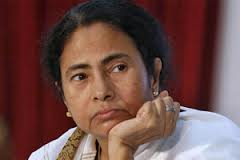
Kolkata, Feb 25: The Censor Board has refused to clear a Bengali film for taking potshots at the swearing-in ceremony of West Bengal Chief Minister Mamata Banerjee and the Singur movement that forced the Tatas to exit the state.
Starring rebel Trinamool Congress MP Kabir Suman, 'Kangal Malsat' (War Cry of Poor) is directed by Suman Mukhopadhyay. It is based on a book written by eminent litterateur Mahasweta Devi's son Nabarun Bhattacharya.
"The way the honourable CM's oath taking ceremony has been shown seems distortion of history and may hurt many common people of West Bengal and create sensation (violence)," the letter issued by the Central Board of Film Certification to the film's producers, says.
The film shows a person watching the swearing-in ceremony with disdain. It also has a controversial shot of Kabir Suman saying in Bengali, 'The Tatas have cut a sorry figure. Now there are so many committees. They are making Kolkata into London..."
The letter says, "The way departure of Tata Company was uttered in the film, it seemed to malign or at least look down upon a significant movement of a civic society.
"The treatment of the film with unnecessary use of abusive language, sexuality and casual approach in portraying social movements may hurt the sentiments of many people in our society," it said.
The letter also claims that the portrayal of Stalin, ruler of erstwhile Soviet Union, has been done so irresponsibly in the film that the dogmatic statement might hurt the sentiments of many his supporters and create unrest during public screening.
Alleging 'political discrimination' by the government, the director has moved the Film Certification Appellate Tribunal challenging the Censor Board's decision.
"As a filmmaker I made a film which I wanted to. Now if it has some political undercurrents it doesn't mean those in power have the power to ban the film. They are trying to gag us," he said.
The film was denied release based on recommendations by a revising committee of the Censor Board, whose members are appointed by the state government.
Filmmaker Haranath Chakraborty, one of the key members of Mamata Banerjee's cultural think-tank group, leads the committee.
"It is clear under whose directions the film was denied release," the director said. PTI NIK PC RAI 02251421
The film fraternity in Kolkata voiced their concern against the Censor Board's decision.
Kabir Suman said the film and his dialogue had nothing which could incite violence or went against the spirit of democracy.
"They are also saying that the film shows vulgarity. We have only tried to show how real people talk. Before us many film-makers in Bengal and in Bollywood have done this. So why are we being targeted only?" he asked.
Novelist Nabarun Bhattacharya said, "No one can stop me from whatever I feel like writing. The government must understand that."
Film-maker and censor board member Haranath, however, insisted that the film contained inappropriate language and could not be allowed for screening.
Earlier in November, the screening of Bengali film '3 Kanya' (Three Women) was cancelled at the Kolkata Municipal Corporation-owned Star Theatre under controversial circumstances.
The film's director and producer Agnidev Chatterjee had said that the controversy arose because some people thought that it was based on the Park Street rape case and showed the government in bad light.





Comments
Add new comment